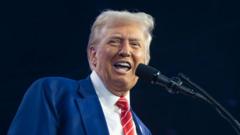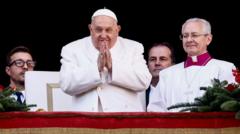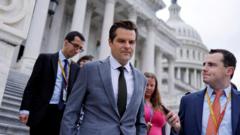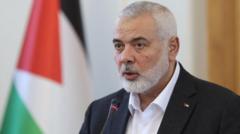The announcement of Mike Huckabee as Trump's nominee for U.S. ambassador to Israel, alongside Steve Witkoff as special envoy to the Middle East, raises questions about the administration's future approach to the Israel-Palestine conflict, reflecting divergent views from various political factions.
Trump's Appointments Hint at Future Middle East Policy Direction

Trump's Appointments Hint at Future Middle East Policy Direction
Trump's choices for ambassador and envoy draw attention from both Israeli and Palestinian perspectives.
Donald Trump’s recent nomination of Mike Huckabee for U.S. ambassador to Israel and Steve Witkoff as special envoy to the Middle East has sparked varied reactions regarding future American policy in the region. Huckabee, the former governor of Arkansas, has emphasized his commitment to implementing Trump’s policies, particularly those that have favored Israel, such as the movement of the U.S. embassy to Jerusalem and the recognition of the Golan Heights as Israeli territory. He expressed confidence that Trump’s prior actions would continue, a sentiment that has been warmly received by the Israeli right-wing but met with trepidation from Palestinian leaders.
Huckabee's stance on Israeli settlements, where he has previously dismissed them as "communities," suggests a continuation of pro-settlement policies that contradict decades of U.S. diplomatic positions. This has invigorated members of the Israeli far-right government, who see his appointment as a potential pathway to annexation of the West Bank territory. Finance Minister Bezalel Smotrich and National Security Minister Itamar Ben-Gvir have publicly celebrated the nomination, viewing it as a signal of support for their ambitions to maintain and expand Israeli territory.
However, experts caution that Huckabee's appointment may not guarantee the implementation of pro-settler policies in U.S. foreign relations. Political correspondent Tal Schneider noted that past presidential administrations with pro-settlement officials did not always lead to similar actions. The trajectory of American policy remains uncertain.
Steve Witkoff, Trump's golf partner and a real estate developer with limited foreign policy experience, echoed Huckabee's sentiments on Trump’s leadership positively impacting Israel. His past comments on the significance of U.S.-Israeli relations and the strictures on Iranian funding highlight a commitment to support previous administration policies, though his practical influence remains unclear.
Responses from Palestinian leaders reveal a profound concern. Mustafa Barghouti, a notable Palestinian politician, expressed fears that Huckabee’s views—deemed incompatible with international law—would further erode the possibility of achieving a two-state solution. This critique underscores the sense of disillusionment within Palestinian communities regarding U.S. foreign policy, especially after experiences under President Biden's administration.
The leads from Trump's appointments underscore a polarized atmosphere, with optimism permeating Israeli hardliners contrasted sharply by apprehensions from Palestinian circles. The dynamic reflects a larger narrative in which diplomatic roles and strategies are closely scrutinized, pointing to the complex landscape that awaits as Trump endeavors to navigate Middle Eastern politics anew.


















